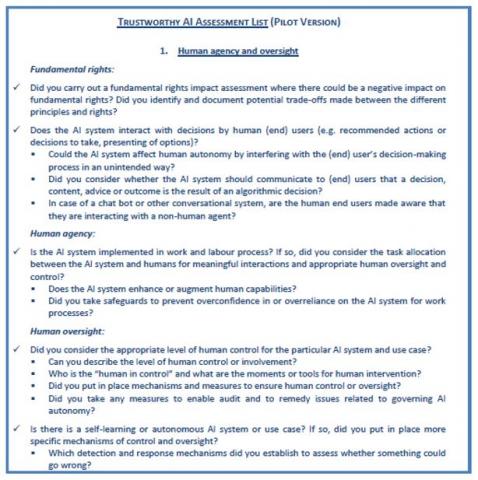Artificial intelligence as a driver for SME competitiveness

During the course of 2019, the independent High-Level Expert Group on Artificial Intelligence (HLEG-AI) set up by the European Commission in June 2018 published two key documents relevant to the development of Artificial Intelligence (AI) for policy makers: ethics guidelines including legal, societal, ethical aspects as well as socio-economic challenges, and recommendations on AI policy development.
1. Ethics Guidelines for Trustworthy AI
The guidelines put forward a human-centric approach on AI and list 7 key requirements that AI systems should meet in order to be trustworthy:
1. 'Human agency and oversight
Including fundamental rights, human agency and human oversight
2. Technical robustness and safety
Including resilience to attack and security, fall back plan and general safety, accuracy, reliability and reproducibility
3. Privacy and data governance
Including respect for privacy, quality and integrity of data, and access to data
4. Transparency
Including traceability, explainability and communication
5. Diversity, non-discrimination and fairness
Including the avoidance of unfair bias, accessibility and universal design, and stakeholder participation
6. Societal and environmental wellbeing
Including sustainability and environmental friendliness, social impact, society and democracy
7. Accountability
Including auditability, minimisation and reporting of negative impact, trade-offs and redress.'
These requirements are detailed in the document and will go through a piloting process expected to conclude with the presentation of a revised document in early 2020. For national and regional policy makers it is useful to note that the document also provides the pilot version of the 'Trustworthy AI Assessment List' serving as a basis for this piloting process. All stakeholders are invited to test the assessment list and provide practical feedback on how it can be improved.
2. Policy and Investment Recommendations
Building on its Ethic Guidelines for Trustworthy AI, the group has put forward '33 recommendations that can guide Trustworthy AI towards sustainability, growth and competitiveness, as well as inclusion – while empowering, benefiting and protecting human beings. The recommendations will help the Commission and Member States to update their joint coordinated plan on AI at the end of 2019.' (Source HLEG-AI)
Image

Source: Ethics Guidelines for Trustworthy AI, HLEG-AI
While those documents are expected to 'play a key role in building the future of Artificial Intelligence in Europe', further initiatives have emerged with a strong focus on short and mid-term application areas relevant to the competitiveness of European SMEs.
For instance, last 18 October 2019, following a successful conference on AI in the automotive industry with strong industrial participation, the Working Group 'Artificial Intelligence' under Priority Area 8 'Competitiveness of the EU Strategy for the Danube Region', coordinated by Pannon Business Network Association (www.pbn.hu) and the Ministry of Economic Affairs of Baden-Württemberg, had its first meeting.
The aim of the Working Group is to identify the potential role of AI in the future of the Danube Region and to determine the potential of public intervention and funds for fostering the spread of AI technologies for the benefit of SMEs and the economic development of the Danube Region. The Working Group shall contribute to 'reveal, synthesize and present concrete projects, which are in line with the Actions set for the Danube Region Strategy by Priority Area 8.' Interested organisations are invited to contact the Working Group coordinator.
Do you have other examples you would like to share that can support the development of artificial intelligence as a driver for SME competitiveness? Share your ideas and comments by tweeting us! #PolicyLearning #AIinSMEcompetitiveness
